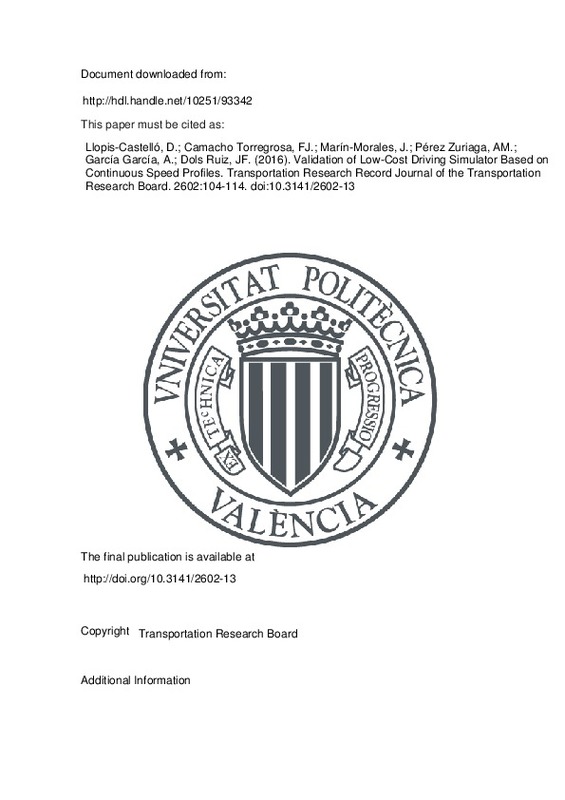JavaScript is disabled for your browser. Some features of this site may not work without it.
Buscar en RiuNet
Listar
Mi cuenta
Estadísticas
Ayuda RiuNet
Admin. UPV
Validation of Low-Cost Driving Simulator Based on Continuous Speed Profiles
Mostrar el registro sencillo del ítem
Ficheros en el ítem
| dc.contributor.author | Llopis-Castelló, David
|
es_ES |
| dc.contributor.author | Camacho Torregrosa, Francisco Javier
|
es_ES |
| dc.contributor.author | Marín-Morales, Javier
|
es_ES |
| dc.contributor.author | Pérez Zuriaga, Ana María
|
es_ES |
| dc.contributor.author | García García, Alfredo
|
es_ES |
| dc.contributor.author | Dols Ruiz, Juan Francisco
|
es_ES |
| dc.date.accessioned | 2017-12-22T07:51:06Z | |
| dc.date.available | 2017-12-22T07:51:06Z | |
| dc.date.issued | 2016 | es_ES |
| dc.identifier.issn | 0361-1981 | es_ES |
| dc.identifier.uri | http://hdl.handle.net/10251/93342 | |
| dc.description.abstract | [EN] The number of road safety studies that are based on driving simulators is growing significantly. The Polytechnic University of Valencia, Spain, developed a low-cost driving simulator for the assessment, training, and rehabilitation of drivers (SE2RCO). The main objective of this research was the validation of the driving simulator so that studies about road safety and highway geometric design that considered human factors could be performed. The validation was based on continuous speed profiles collected from 28 volunteers on a 30-km-long, two-lane rural road section. The same volunteers drove through the same road section built in SE2RCO. Speed data of 79 curves and 52 tangents were selected for the analysis. Comparison of the real and simulated speeds ensured the simulator's objective validity according to average and operating speeds. Two models were developed to predict field speeds from simulated speeds. Results showed that a simulated average speed lower than approximately 90 km/h was linked to a similar real average speed. For higher simulated speeds, the average speed in the real environment was lower than the simulated one. In addition, the actual operating speed was around 5 km/h lower than the operating speed in the driving simulator. Most volunteers assessed the quality and similarity of the virtual environment compared with the real world as medium or high and assessed the driving tasks similarly, thus achieving subjective validation of the simulator. | es_ES |
| dc.description.sponsorship | The authors thank the Polytechnic University of Valencia, which subsidized the research project CONSIM-Desarrollo de un Modelo para la Evaluacion de la Consistencia del Diseno Geometric de Carreteras Convencionales Mediante Simuladores de Conduccion. The study presented here was also part of the research project titled CASEFU-Estudio Experimental de la Funcionalidad y Seguridad de las Carreteras Convencionales, which was subsidized by the Spanish Ministry of Economy and Competitiveness and the European Social Fund. | |
| dc.language | Inglés | es_ES |
| dc.publisher | Transportation Research Board | es_ES |
| dc.relation.ispartof | Transportation Research Record Journal of the Transportation Research Board | es_ES |
| dc.rights | Reserva de todos los derechos | es_ES |
| dc.subject | Accident prevention | es_ES |
| dc.subject | Automobile simulators | es_ES |
| dc.subject | Highway engineering | es_ES |
| dc.subject | Highway planning | es_ES |
| dc.subject | Human computer interaction | es_ES |
| dc.subject | Motor transportation | es_ES |
| dc.subject | Roads and streets | es_ES |
| dc.subject | Rural roads | es_ES |
| dc.subject | Simulators | es_ES |
| dc.subject | Street traffic control | es_ES |
| dc.subject | Transportation | es_ES |
| dc.subject | Virtual reality | es_ES |
| dc.subject | Average speed | es_ES |
| dc.subject | Driving simulator | es_ES |
| dc.subject | Driving tasks | es_ES |
| dc.subject | Highway geometric design | es_ES |
| dc.subject | Operating speed | es_ES |
| dc.subject | Real environments | es_ES |
| dc.subject | Road section | es_ES |
| dc.subject | Speed profile | es_ES |
| dc.subject.classification | INGENIERIA MECANICA | es_ES |
| dc.subject.classification | INGENIERIA E INFRAESTRUCTURA DE LOS TRANSPORTES | es_ES |
| dc.title | Validation of Low-Cost Driving Simulator Based on Continuous Speed Profiles | es_ES |
| dc.type | Artículo | es_ES |
| dc.identifier.doi | 10.3141/2602-13 | es_ES |
| dc.relation.projectID | info:eu-repo/grantAgreement/UPV//SP20120790/ | es_ES |
| dc.relation.projectID | info:eu-repo/grantAgreement/MINECO//TRA2013-42578-P/ES/ESTUDIO EXPERIMENTAL DE LA FUNCIONALIDAD Y SEGURIDAD DE LAS CARRETERAS CONVENCIONALES/ | es_ES |
| dc.rights.accessRights | Abierto | es_ES |
| dc.contributor.affiliation | Universitat Politècnica de València. Departamento de Ingeniería Mecánica y de Materiales - Departament d'Enginyeria Mecànica i de Materials | es_ES |
| dc.contributor.affiliation | Universitat Politècnica de València. Departamento de Ingeniería e Infraestructura de los Transportes - Departament d'Enginyeria i Infraestructura dels Transports | es_ES |
| dc.contributor.affiliation | Universitat Politècnica de València. Instituto del Transporte y Territorio - Institut del Transport i Territori | es_ES |
| dc.description.bibliographicCitation | Llopis-Castelló, D.; Camacho Torregrosa, FJ.; Marín-Morales, J.; Pérez Zuriaga, AM.; García García, A.; Dols Ruiz, JF. (2016). Validation of Low-Cost Driving Simulator Based on Continuous Speed Profiles. Transportation Research Record Journal of the Transportation Research Board. 2602:104-114. https://doi.org/10.3141/2602-13 | es_ES |
| dc.description.accrualMethod | S | es_ES |
| dc.relation.publisherversion | http://doi.org/10.3141/2602-13 | es_ES |
| dc.description.upvformatpinicio | 104 | es_ES |
| dc.description.upvformatpfin | 114 | es_ES |
| dc.type.version | info:eu-repo/semantics/publishedVersion | es_ES |
| dc.description.volume | 2602 | es_ES |
| dc.relation.pasarela | S\308335 | es_ES |
| dc.contributor.funder | Universitat Politècnica de València | es_ES |
| dc.contributor.funder | Ministerio de Economía, Industria y Competitividad | es_ES |







![[Cerrado]](/themes/UPV/images/candado.png)

